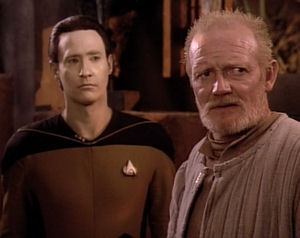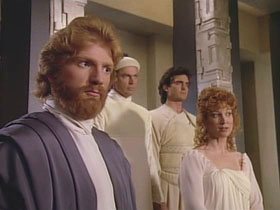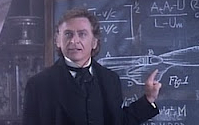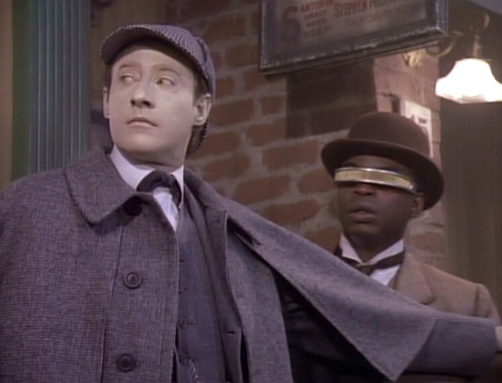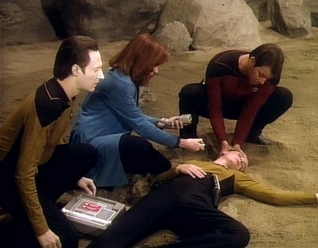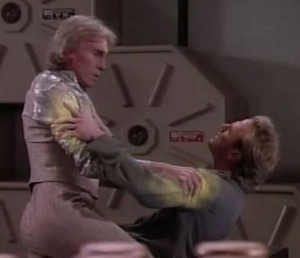I’m examining the impact Star Trek: The Next Generation had on my formation. The introduction to this series can be seen here.
The Child
Counselor Troi finds herself mysteriously pregnant, which rapidly progresses into a child that ages quickly. Other crew members are immersed in a dangerous project involving transportation of virus samples.
When the show got picked up for a second season, a significant number of elements were retooled. Geordi becomes chief engineer, and Dr. Crusher is shipped away.1 Number One gains a beard, and the ship gains a bar and bartender. Wesley has had a growth spurt, and in this first episode he contemplates his future.
First, let’s talk about Counselor Troi [TW for this section: issues around rape and conception]. Her own feelings about the mysterious conception of her child are not mentioned aloud a single time, presumably because an exploration of rape is just not where the writers wanted to go.2 The closest we come to knowing how she feels occurs in a scene in the conference lounge, where the senior staff is informed of her pregnancy. The others discuss the fate of her child as though they have a say in it, commenting primarily on issues of the ship’s safety. She, however, has separated herself from them physically, sitting at the far end of the table from everyone else. She is visibly preoccupied, presumably with her situation in general, and says nothing for most of the meeting. I can only guess that the physical separation is the one clue we’re given that she may have feelings of violation and/or uncleanness from the mysterious conception. It is never said.
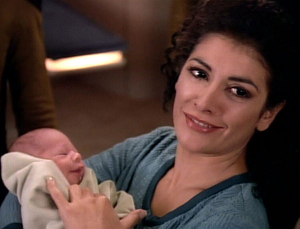 By the end of the meeting, Troi has informed everyone of her decision to keep the child. She bonds powerfully and lovingly with the strange being as he’s born and grows, seemingly without any emotional complications for her. They have a unique communication between them, and it is possible that the child somehow communicates to her in some way that relieves the situation of its potentially violating elements. Again, it’s never discussed. The complete omission is… disturbing to me at this point. At that time, I had uneasiness but couldn’t place it. I do remember being angry at Riker for his selfish response (anger and indignation, and demands to know who the father was). Whether the choice to write Riker’s response that way was an intentional reflection of the anger that rape victims can receive, or whether someone simply felt that his voicing of that anger was appropriate, I don’t know.4
By the end of the meeting, Troi has informed everyone of her decision to keep the child. She bonds powerfully and lovingly with the strange being as he’s born and grows, seemingly without any emotional complications for her. They have a unique communication between them, and it is possible that the child somehow communicates to her in some way that relieves the situation of its potentially violating elements. Again, it’s never discussed. The complete omission is… disturbing to me at this point. At that time, I had uneasiness but couldn’t place it. I do remember being angry at Riker for his selfish response (anger and indignation, and demands to know who the father was). Whether the choice to write Riker’s response that way was an intentional reflection of the anger that rape victims can receive, or whether someone simply felt that his voicing of that anger was appropriate, I don’t know.4
Next, let’s talk about the new doctor, Kathryn Pulaski. I had expected – with a more mature, adult perspective under my belt, after years of handling interpersonal conflict and generally seeing people as more complex now – that I wouldn’t have such strong animosity toward her as I did as a child. I was wrong. She evokes far more hostility in me today, probably because I can see she’s not just having conflict with coworkers. She’s disrespecting them, and in one case, behaving abusively towards them.
Dr. Pulaski is first introduced by having her breach a major protocol with Captain Picard. We discover that instead of reporting to him the way she should have, she’s met with Deanna to discuss her situation. But Pulaski is entirely remorseless about her bad first impression, and there’s no indication given that this breach was necessary or that she regrets it. It’s, again, a poor first impression, but she could have recovered from that, has she shown some other redeeming quality.
The other major character development is her reaction to Data. Because of her preconceived notions about him, she feels justified in dismissing his personhood entirely, naming him nothing but machinery. Her actions toward him range from firmly believing he could be no comfort for a friend in need, to insisting that his fucking name just really isn’t that important. There’s a host of other moments where minor actions and word choices on her part suggest a treatment of Data that is less than his other colleagues in Starfleet, and is more akin to how one would treat a piece of furniture. The kicker is that when she is confronted about some of this inappropriate behavior, she responds only with smugness and further belittlement. Not only did she decide Data isn’t a person before she met him, but she’s uninterested in learning any truth about him.
Now, unpacking prejudice in a central character could be done in a really interesting way. But the key to that being interesting, and not just an obnoxious waste of my time, is having a) some other redeeming quality to the character, b) some complex look into why they have these blind spots or confusions, or preferably both. Further, I would need there to be some acknowledgement from the storytellers that this prejudice is problematic, and not just an endearing character flaw. None of this is present in Pulaski.
My best guess as to what the hell the writers were doing is a combination of 1) trying to make a new McCoy, hoping that the fan base would transfer and the magic of the McCoy/Spock bickering would be reborn, and 2) getting rid of more of that pesky peacefulness by throwing more interpersonal conflict into the crew. I have got no problem at all delving into more depth around conflict and tension between crew members; in fact, I’d prefer it. But there is all manner of dramatic tension that is much more compelling than setting loose a new bully.
We can talk a little about Wesley too. He doesn’t have much to do until the end of the episode, when he’s preparing to leave the Enterprise to join his mother. He has an enjoyable exchange with Guinan where she asks if he always does what he’s told to do. Wesley says yes, and considers it a virtue. Guinan suggests he look into the virtues of being selfish instead. Eventually, Wesley asks Captain Picard for permission to stay.
I haven’t talked much about how thoroughly I identify with Wesley, but this is a huge reason why. I wouldn’t have the wherewithal or understanding for a long while to act on this small lesson he learns here. But eventually I’d learn how to temper my gifts for following and obedience, and how to deeply value this kind of selfishness. His unfolding search for his own path mirrors my own for a long time. This is just the first step. And there are some ways in which the steps he eventually takes were thrilling and freeing for me.
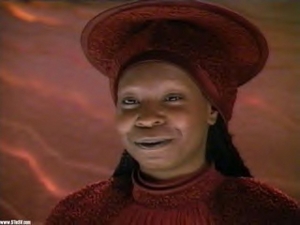 Finally, let’s talk about Guinan. I remember liking Guinan, and learning a thing or two from her. What I’m most struck by here is that she’s got more skills as a counselor than we’ve seen yet (or will see) from Troi. So, I’m glad to see Guinan again, and I’m glad for what she says to Wesley… but it’s like I’m seeing the cars skidding towards each other in the wreck that Deanna’s character will be most of the time. She already has so little to do. And now she’s got major competition in the ship’s bartender. I guess there’s still a limit to what constitutes women’s work on the Enterprise.
Finally, let’s talk about Guinan. I remember liking Guinan, and learning a thing or two from her. What I’m most struck by here is that she’s got more skills as a counselor than we’ve seen yet (or will see) from Troi. So, I’m glad to see Guinan again, and I’m glad for what she says to Wesley… but it’s like I’m seeing the cars skidding towards each other in the wreck that Deanna’s character will be most of the time. She already has so little to do. And now she’s got major competition in the ship’s bartender. I guess there’s still a limit to what constitutes women’s work on the Enterprise.
1. My recollection of the interviews the actress was eventually allowed to do is that she was never given a clear reason for being let go… not when they did it, and not when they hired her back a year later.
2. This script was originally written for a second series that never materialized, and the mother of the child was Ilia, the character from the first Trek movie. This explains – but does not make any less problematic – the fact that Deanna’s body is at the center of the story, but she feels interchangeable as a character and as the child’s mother.
3. From http://www.startrek.com/article/marina-sirtis-part-2-from-convention-queen-to-evil-queen
4. I have third-hand reports of discussions that supposedly happened on set, and these reports keep rolling around in my head as I watch. One of the officials at a convention I attended spoke of comments that either Patrick Stewart or Jonathan Frakes made, where they described both men sitting down with certain members of the writing staff, and refusing to perform in certain scenes until female characters were rewritten in a less sexist and offensive way. I keep wondering what got changed, and how the cast feels about what made it to camera.
5. From http://daharadreaming.tumblr.com/post/20845655111/there-just-arent-enough-women-in-general-women

